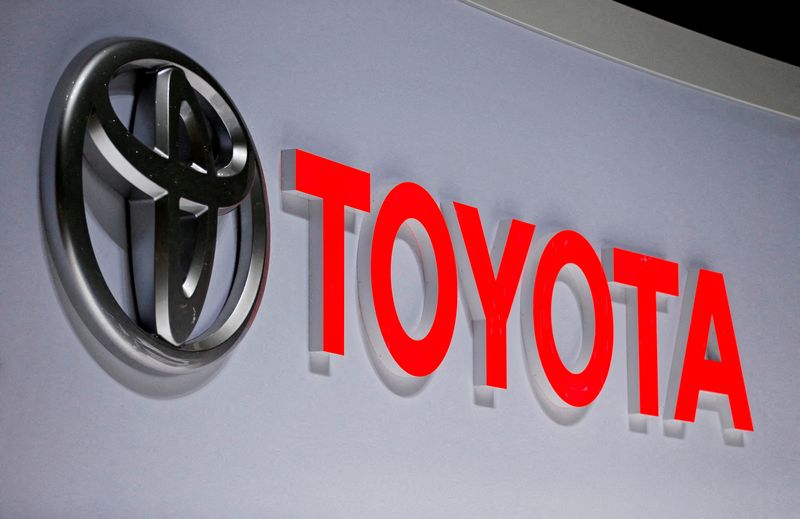By Satoshi Sugiyama
TOKYO (Reuters) - Toyota Motor (NYSE:TM) Corp on Tuesday posted a worse-than-expected 25% drop in quarterly profit and cut its annual output target, as the Japanese firm battles surging material costs and a persistent semiconductor shortage.
The world's biggest automaker by sales also warned that it remained difficult to predict the future after posting its fourth consecutive quarterly profit decline, underlining the strength of business headwinds it faces.
During the coronavirus pandemic, Toyota fared better than most car makers in managing supply chains, but it fell victim to the prolonged chip shortage this year, cutting monthly production targets repeatedly.
"We're out of the worst phase, but ... it's not necessarily a situation where we're fully supplied," said Kazunari Kumakura, Toyota's purchasing group chief. "I don't know when the chip shortage will be resolved."
Operating profit for the three months ended September fell to 562.7 billion yen ($3.79 billion), well short of an average estimate of 772.2 billion yen in a poll of 12 analysts by Refinitiv. Toyota sales reported a 749.9 billion yen profit a year earlier, and 578.6 billion yen in profit in the first quarter.
Kumakura said the global auto chip shortage continues, as chipmakers have prioritised supplies for electronics goods such as smartphones and computers, while natural disasters, COVID lockdowns and factory disruption have slowed a recovery in auto chip supplies.
He also said the supply of older-type semiconductors, that attract little capital investment currently, would remain tight.
Amid the gloom, shares in Toyota closed down 1.9%, versus a 0.3% rise in the Nikkei average.
'VERY UNIMPRESSIVE'
Some analysts were underwhelmed by the performance, saying other positive factors beyond the chip shortage should have provided a boost.
"The yen is weaker in the second quarter, the volume in the second quarter is much higher than in the first quarter, and the (COVID) lockdown in China does not affect (the volume in the second quarter)," said Koji Endo, an analyst at SBI Securities.
"Considering these points ... the absolute amount of profit in the second quarter has got to be higher than that of the first quarter. It is very unimpressive."
Production rebounded by 30% in the quarter, but the company warned last week shortages of semiconductors and other components would continue to constrain output in coming months.
Toyota said it now expects to produce 9.2 million vehicles this fiscal year, down from the previously forecast 9.7 million but still ahead of last financial year's production of about 8.6 million units.
Reuters reported last month Toyota had told several suppliers it was setting a global target for the current business year to 9.5 million vehicles and signalled that forecast could be lowered, depending on the supply of electromagnetic steel sheets.
MUTED YEN IMPACT
The yen has plunged around 30% this year against the U.S. dollar, but the benefit of the cheap yen - making sales overseas worth more - has been offset by soaring input costs.
The weak yen boosted profit by 565 billion yen in the first half of this financial year, but the gain was more than wiped out by 765 billion yen increase in material costs, with the cheap local currency further inflating import costs, Toyota said.
Toyota retained its conservative profit outlook, sticking to its full-year operating forecast of 2.4 trillion yen for the fiscal year through March 31 - well below analysts' average forecast of 3.0 trillion yen.
By comparison, South Korea's Hyundai Motor raised its revenue and profit margin guidance last month to reflect a foreign exchange lift.
Toyota, once a darling of environmentalists for its hybrid gasoline-electric models, is also under scrutiny from green investors and activists over its slow push into fully electric vehicles (EV).
Just a year into its $38 billion EV plan, Toyota is already considering rebooting it to better compete in a market growing beyond its projections, Reuters reported last month.
In a reputational hit, Toyota had to recall earlier this year its first mass-produced all-electric vehicle after just two months on the market due to safety concerns, and suspend production. It restarted taking leasing orders last month for domestic market.
Toyota reiterated on Tuesday that battery-powered EVs are a powerful weapon for decarbonisation, but that there are various other options to achieve the goal.
($1 = 148.3100 yen)
